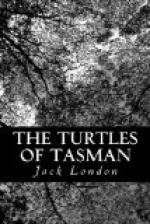“Now if he was goin’ to a masquerade ball....”
“Or attendin’ a reunion of the Rough Riders....”
“Or goin’ huntin’ bear....”
“Or swearin’ off his taxes....”
“Instead of goin’ all the way to the effete East—Monkton says he’s going clear to Boston....”
The two drivers held each other apart at arm’s length, and fell limply together again.
For Josiah Childs’ outfit was all their actions connotated. His hat was a light fawn, stiff-rimmed John B. Stetson, circled by a band of Mexican stamped leather. Over a blue flannel shirt, set off by a drooping Windsor tie, was a rough-and-ready coat of large-ribbed corduroy. Pants of the same material were thrust into high-laced shoes of the sort worn by surveyors, explorers, and linemen.
A clerk at a near counter almost petrified at sight of his employer’s bizarre rig. Monkton, recently elevated to the managership, gasped, swallowed, and maintained his imperturbable attentiveness. The lady bookkeeper, glancing down from her glass eyrie on the inside balcony, took one look and buried her giggles in the day book. Josiah Childs saw most of all this, but he did not mind. He was starting on his vacation, and his head and heart were buzzing with plans and anticipations of the most adventurous vacation he had taken in ten years. Under his eyelids burned visions of East Falls, Connecticut, and of all the home scenes he had been born to and brought up in. Oakland, he was thoroughly aware, was more modern than East Falls, and the excitement caused by his garb was only to be expected. Undisturbed by the sensation he knew he was creating among his employes, he moved about, accompanied by his manager, making last suggestions, giving final instructions, and radiating fond, farewell glances at all the loved details of the business he had built out of nothing.
He had a right to be proud of Childs’ Cash Store. Twelve years before he had landed in Oakland with fourteen dollars and forty-three cents. Cents did not circulate so far West, and after the fourteen dollars were gone, he continued to carry the three pennies in his pocket for a weary while. Later, when he had got a job clerking in a small grocery for eleven dollars a week, and had begun sending a small monthly postal order to one, Agatha Childs, East Falls, Connecticut, he invested the three coppers in postage stamps. Uncle Sam could not reject his own lawful coin of the realm.
Having spent all his life in cramped New England, where sharpness and shrewdness had been whetted to razor-edge on the harsh stone of meagre circumstance, he had found himself abruptly in the loose and free-and-easy West, where men thought in thousand-dollar bills and newsboys dropped dead at sight of copper cents. Josiah Childs bit like fresh acid into the new industrial and business conditions. He had vision. He saw so many ways of making money all at once, that at first his brain was in a whirl.




